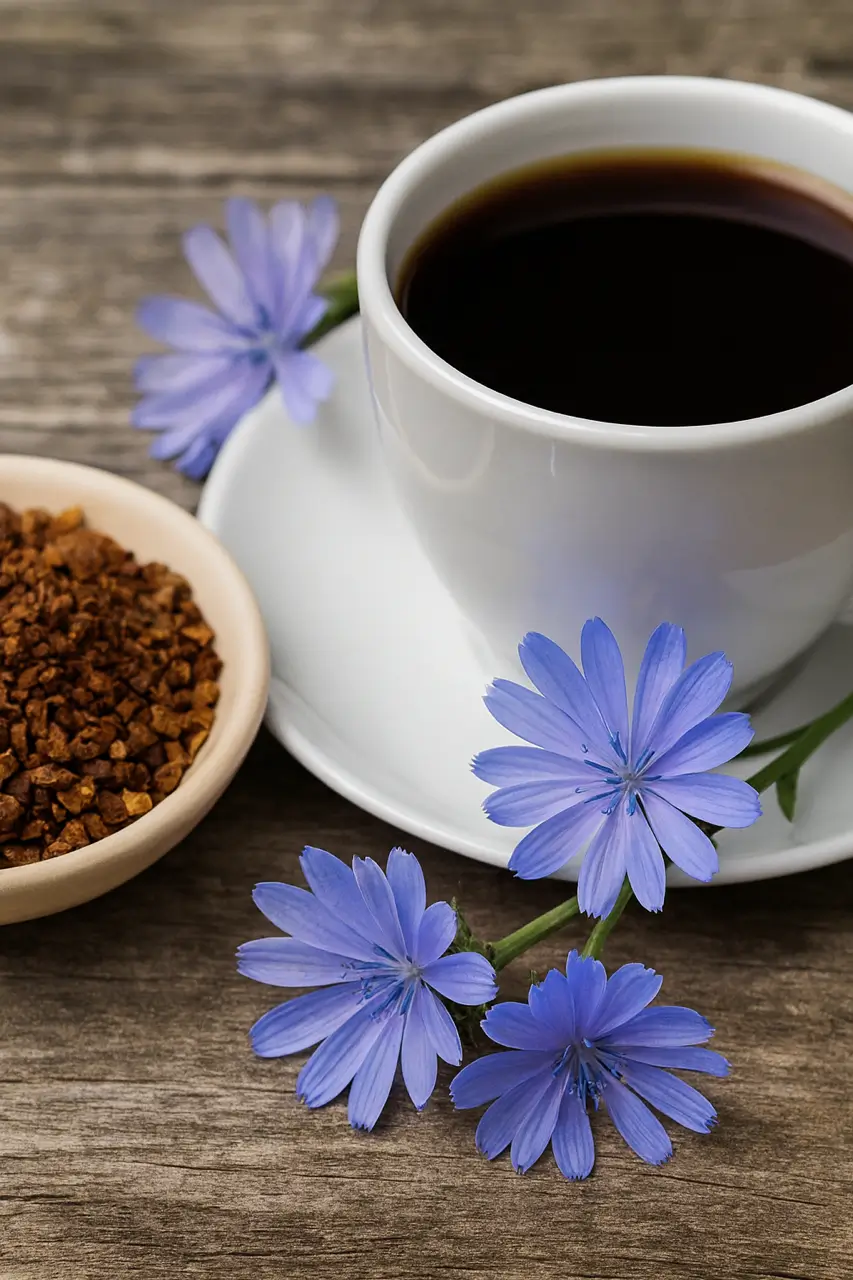Craving a delicious, stimulating drink but want to skip the caffeine jitters? You should definitely check out coffee alternatives. Chicory coffee, for example, gives you a unique and satisfying experience. Many people find it a great caffeine-free option. It comes from the roasted and ground chicory root—you might know it as Cichorium intybus. While it looks a lot like traditional coffee in color and body, its flavor is all its own, with a deep cultural story, especially in New Orleans. Let’s look at why chicory coffee is such an interesting choice, from its history to its health perks and how to brew it.
- What chicory coffee is
- Chicory coffee: A journey through time
- Taste difference: Chicory coffee vs. traditional coffee
- Brewing and serving chicory coffee: Your guide
- Health benefits and potential drawbacks of chicory coffee
- Where is chicory coffee most popular?
- Chicory coffee: Your guide to this caffeine-free option
What chicory coffee is
Chicory coffee is simple: it’s a drink made from the roasted, ground roots of the chicory plant (Cichorium intybus) and brewed with hot water. You get a coffee-like experience, but without any caffeine.
Where chicory coffee comes from
For pure chicory coffee, the main ingredient is just the chicory root itself, harvested from the common chicory plant, Cichorium intybus. We put this root through a special process to turn it into something coffee-like. First, we harvest, wash, slice, and dry the roots. Then, we roast them until they turn a dark brown. Finally, we grind that roasted root into a fine powder, ready for brewing. You should know that pure chicory root coffee has no caffeine, which really sets it apart from traditional coffee beans.
Ingredients and what makes it special
Chicory root powder and water are the two main things you need for chicory coffee. You brew them much like regular coffee, just steeping the grounds in hot water to get their flavor out. Some blends, like the famous New Orleans-style coffee, even mix in regular coffee with the chicory for a distinct taste. One thing that makes chicory coffee stand out is its high content of inulin. This is a great prebiotic fiber that really helps your gut health.
Chicory coffee: A journey through time
Chicory coffee has a long history, going back centuries and spanning different continents. It truly has deep cultural roots in many places.
From ancient medicine to coffee substitute
People used chicory root as far back as ancient Egypt, mostly for medicinal purposes. It became a coffee substitute in Northern Europe during the 18th century, especially in the Prussian Empire. German leaders really pushed roasted chicory root as a replacement because coffee imports were heavily restricted and even banned. This idea caught on in France after Napoleon’s Continental Blockade (1808–1814). Coffee was scarce, so chicory became a necessary addition to their drinks.
New Orleans: A cultural icon for chicory coffee
When you think of coffee and chicory, you probably think of New Orleans and Louisiana. French immigrants brought this tradition to America in the early 19th century, mixing their heritage with local customs. During the Civil War, people started using chicory coffee to stretch out their limited coffee supplies. What began as a necessity soon became a strong regional favorite. Today, this tradition is still a huge part of New Orleans culture. Just look at Café du Monde, where they famously make café au lait with coffee and chicory. It really defines a big part of the city’s identity.
Chicory coffee around the world
Around the globe, chicory coffee often filled in as a cheap coffee substitute when supplies were low. But its deep cultural roots, where it’s a cherished tradition rather than just a stand-in, are strongest in New Orleans and other places with French influence. The distinctive sweetness and body from inulin, a component of the chicory plant, really sets its flavor apart. Many substitutes disappeared once coffee became easy to find again, but chicory coffee has held its own. It’s a deliberate and proud tradition in these cultural strongholds.
Taste difference: Chicory coffee vs. traditional coffee
Chicory coffee has a distinct taste, making it quite unique when you compare it directly to traditional coffee.
Unpacking chicory’s unique taste
Pure chicory coffee usually tastes more bitter, robust, earthy, malty, and caramel-like. You’ll notice clear roasted and nutty notes. It also has a really satisfying full-bodied and creamy texture. Here’s a cool trick: steeping it longer can actually bring out more of its natural sweetness, thanks to the greater inulin extraction. Many people find the chicory coffee taste unique; it’s definitely an acquired preference.
Chicory coffee vs. regular coffee: Side-by-side differences
Comparing chicory coffee and traditional coffee shows you some clear differences. Traditional coffee offers a wider range of flavors – think sweet, fruity, acidic, and smoky notes – and it contains caffeine, which gives it that bitterness and stimulating kick. Chicory coffee, on the other hand, is naturally caffeine-free. It has a stronger bitterness and earthiness, and you won’t find the plant oils that traditional coffee beans have. This really makes chicory coffee a totally different drinking experience.
| Aspect | Chicory Coffee | Traditional Coffee |
|---|---|---|
| Bitterness | More bitter and robust; earthy, woody, subtle natural sweetness | Variable bitterness; ranges from sweet, fruity to acidic depending on roast |
| Roasting Notes | Deep roasted flavor; toasty, nutty, caramel, chocolate hints | Often more complex; diverse notes like nutty, earthy, fruity, smoky |
| Body / Texture | Full-bodied with an almost creamy mouthfeel despite bitterness | Varies, often smooth but depends on brewing and bean type |
| Aroma | Strong, inviting roasted aroma resembling coffee but distinct | Complex and often more aromatic with varied scent profiles |
| Caffeine Content | Naturally caffeine-free | Contains caffeine; stimulating effects |
| Flavor Versatility | Can be enjoyed alone or blended; enhanced with milk, sweeteners | Flexible in preparation methods; wide flavor experimentation |
| Overall Impression | Bold, rich, nutty, earthy character; perceived as stronger but milder on acidity than coffee | Broad spectrum of flavors and acidity; favored for stimulating effects and flavor diversity |
Brewing and serving chicory coffee: Your guide
Getting your chicory coffee ready to enjoy is pretty straightforward, much like brewing traditional coffee.
Preparing chicory root for brewing
To get chicory root ready for brewing, you need to turn the raw root into usable grounds. First, you’ll wash and dry the roots completely. Then, chop them into small, even pieces so they roast uniformly. Next, roast these pieces until they’re golden brown—usually around 350°F (175°C) for 30–45 minutes, or until you smell that distinct coffee-like aroma. Finally, grind the roasted chicory root to a medium consistency, which works well for most brewing methods.
Popular brewing methods for chicory coffee
You can use most of your usual coffee-making gear to brew chicory grounds. Popular choices include drip coffee makers, a French press, espresso machines, or pour-over devices. You can brew chicory coffee by itself, or mix it with traditional coffee grounds before brewing – a common mix is one part chicory to three parts coffee. It’s really versatile, so everyone can learn how to make chicory coffee easily.
Creative ways to serve chicory coffee
You can enjoy chicory coffee in some great ways. Serve it hot, often with milk or cream and sugar; that really helps balance its natural bitterness and earthy notes. For an iced version, just brew it hot, let it cool, and then pour it over ice. You might want to brew it a little stronger to make up for the dilution. Cold brew chicory coffee is another popular choice. Steep the grounds in cold water for 12–24 hours, and you’ll get a smooth, less acidic, subtly sweet drink, best served chilled with water, milk, or creamer.
- Serve hot with milk, cream, and sugar.
- Make iced coffee by brewing hot and chilling it.
- Try cold brew chicory coffee for a smoother, less acidic option.
Health benefits and potential drawbacks of chicory coffee
Beyond its unique taste, chicory coffee offers some health benefits, but you should also keep a few things in mind.
The goodness of inulin: Gut health and more
A big health benefit of chicory coffee is how much it helps your gut health. That’s mainly because it’s packed with inulin. Inulin is a strong prebiotic fiber that really encourages healthy gut bacteria to grow, which is key for good digestion. Other chicory coffee benefits might include help with blood sugar management and anti-inflammatory effects from compounds in the root. Plus, you get small amounts of important nutrients like vitamin B6, manganese, folate, potassium, and vitamin C. Since it’s a caffeine-free alternative, it helps you steer clear of common side effects like jitters, a fast heart rate, and trouble sleeping. It’s simply a good addition to a health-conscious diet.
Who should be careful with chicory coffee? (IBS, allergies)
Even with its benefits, you should approach chicory coffee with caution sometimes. Too much inulin, its main fiber, can cause digestive problems like bloating. It might also make symptoms worse if you have conditions like irritable bowel syndrome (IBS) or Crohn’s disease. Also, if you’re allergic to ragweed, daisies, or similar plants, you could have allergic reactions to chicory. Always talk to a doctor if you’re worried about adding new foods to your diet.
Is chicory coffee a healthy alternative?
Chicory coffee makes a good caffeine-free alternative to traditional coffee. It offers solid health benefits, especially for your gut thanks to its inulin content, and it has a distinct flavor. Still, you need to think about your own tolerance and any potential downsides, like digestive sensitivities or plant allergies, to make sure it’s the right healthy choice for you.
Where is chicory coffee most popular?
Chicory coffee is most popular in certain places and cultures around the world. This really shows its historical and culinary importance.
New Orleans: An enduring legacy
New Orleans truly is the heart of chicory coffee culture. The city’s long history with it ties strongly into Southern cuisine and its famous hospitality. Visitors and locals often enjoy this rich, earthy drink with local treats such as fluffy beignets. The unique blend of New Orleans coffee with chicory has become a recognizable part of the city’s unique food identity.
Chicory coffee worldwide
Beyond New Orleans, chicory coffee is also drunk in other parts of the world. Countries like France, India, and even parts of Europe, including Italy, have long enjoyed this beverage. Its popularity there comes from different things—like needing a coffee substitute during shortages, simply loving its unique taste, or the growing trend for caffeine-free drinks. In places like Vietnam, they even use it in traditional brewing methods to give a distinctive flavor.
Chicory coffee: Your guide to this caffeine-free option
So, chicory coffee is a pretty cool caffeine-free coffee alternative that comes from roasted chicory root. Its journey—from ancient medicinal uses to a cultural staple in New Orleans—is quite something. That unique, earthy, robust flavor, plus the health benefits from inulin, makes it a standout choice for many. Whether you want to cut back on caffeine or just try something new, chicory coffee offers a truly satisfying and flavorful experience.









